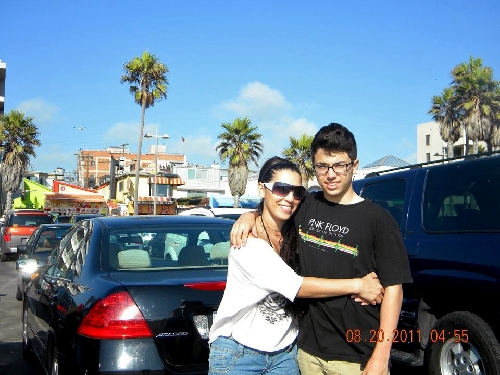A Henderson mother tries to cure her son of a rare brain cancer

Even after the doctors told Janine Kinard to enjoy the last few months with her son because he would die, she was determined that he could beat his cancer.
“I thought I was going to faint when they said that,” Kinard said.
Instead of accepting the doctors’ advice, Kinard has decided to seek an alternative treatment to cure her son.
Earlier this year, 17-year-old Donovan Caruso, a Henderson resident, started complaining that he was having headaches.
“I thought it was just the change in the weather or allergies,” Kinard said.
By April, when the headaches got severe, Kinard took Caruso to the hospital, where he was diagnosed with gliosarcoma, a rare brain cancer.
“It usually is only seen in people who are 40, 50 or 60,” Kinard said. “It is so rare, most doctors never come across cases.”
The tumor in Caruso’s brain was hemorrhaging, which caused the headaches.
The only thing that prepared Kinard for such devastating news was the fact that Caruso is her second child to be diagnosed with cancer.
“When Anthony (her second son) was 18 months, he was diagnosed with liver cancer,” Kinard said.
Kinard noticed a change in her baby’s health and took him to different physicians to see what was wrong.
“They said he was lactose-intolerant,” Kinard recalled. “They said he was just gassy. But I knew something was wrong.”
When Kinard took him to Sunrise Hospital & Medical Center, doctors noticed something was wrong with Anthony’s liver and admitted him. He was diagnosed with hepatocellular carcinoma, or liver cancer.
“We pretty much never left the hospital after that,” Kinard said. “Whenever he was discharged, we would always come back because he would get sick or have a bloody nose that wouldn’t stop.”
The doctors tried chemotherapy to shrink the cancer, which covered 80 percent of Anthony’s liver. But about nine months later, the chemotherapy hadn’t done what doctors had hoped. Anthony’s only option was a transplant.
“So I carried a beeper around waiting for a call (to see if he would get a transplant),” Kinard said.
Within two weeks, that call came and Anthony was taken to the University of California, Los Angeles Medical Center, where he got his new liver.
“He was discharged 12 days after the transplant,” Kinard said. “It usually takes four to six weeks, they said. They called him ‘Wonder Boy.’ “
Anthony, who is in remission, is healthy and continues to take medicine for his liver.
More than 11 years later, Kinard’s nightmare returned.
“The only way to describe it is my worst fears have come true,” Kinard said. “(Both cancer cases) are not hereditary. They don’t know what caused them. Doctors just say I was dealt a rough hand.”
The doctor gave Kinard an outline of the treatment for Caruso: radiation treatment, followed by 365 days of chemothearpy.
“All the paperwork I read, I kept seeing the word ‘experimental’ or ‘flip of a coin,’ ” Kinard said.
During her research, Kinard watched the film “Cancer is Serious Business.” One of the people in the film talked about his daughter, who had a form of brain cancer and was subjected to radiation treatments.
“He talked about how her hair was so damaged it would never grow back,” Kinard said. “The radiation was so toxic, they had to change her diapers with gloves.”
In the end, the girl’s tumor had shrunk, but the radiation treatment had taken its toll.
“It was killing bad cells, but it was also killing good cells, too,” Kinard said. “It was packing a punch. She died in part because of the radiation.”
The father said he was a fool not to have done more research about the treatment.
But Kinard was learning from his mistakes. The more she read, the more common it seemed that people with Caruso’s cancer who underwent radiation treatment died within 14 months.
Kinard’s first hope was to have him admitted to the Houston-based Burzynski Clinic, which specializes in alternative cancer treatments. To be admitted, Caruso would have to undergo chemotherapy and radiation treatment. If those methods failed, he could be considered for the program.
“We wouldn’t even know if he would be eligible,” Kinard said.
Kinard then found the Independent Cancer Research Foundation Inc., which is based in Missouri.
After talking to the director and others on the board of directors, the foundation helped Kinard set up an experimental protocol specific to Caruso’s diagnosis.
Part of the treatment includes a raw food diet with completely organic materials, which the whole family is now doing.
“I am strict,” Kinard said.
Caruso also takes supplements from cod liver pills to flax seed.
Kinard hopes to take Caruso back to the doctor in the next month to schedule follow-up tests to see if the treatment is working.
Kinard and family friends have held a few fundraisers to help with the cost of treatment. For more information or to make a donation, visit facebook.com/donovanteam or email janinesells
homes@yahoo.com.
Contact Henderson/Anthem View reporter Michael Lyle at mlyle@viewnews.com or 387-5201.












